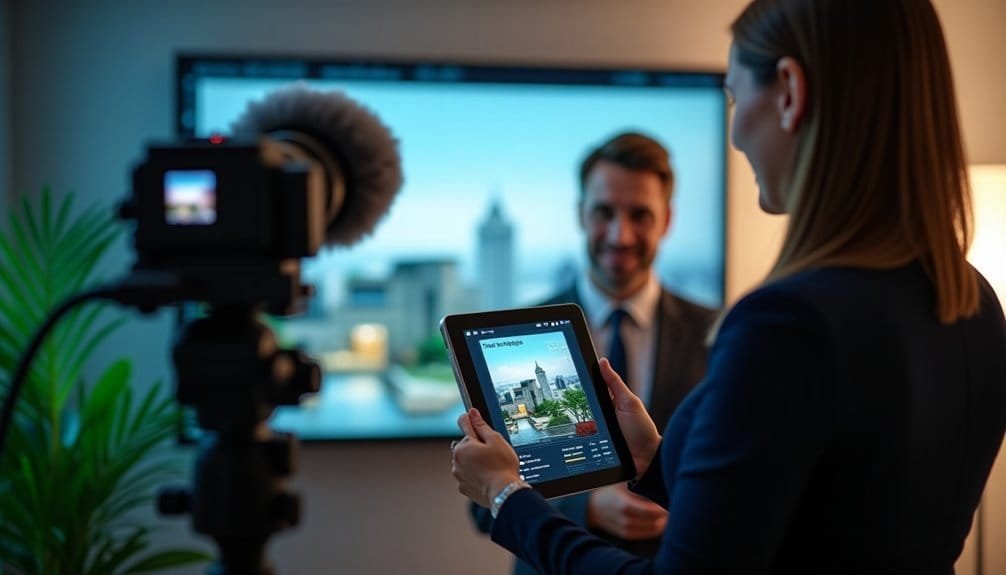To generate organic real estate leads, focus on local SEO by using location-specific keywords like “homes for sale in [city].” Tools such as Google Keyword Planner help find effective keywords, especially long-tail phrases like “3-bedroom homes in [neighborhood]” which reduce competition. Optimize your Google My Business profile to enhance local visibility. Create engaging content by incorporating relevant keywords, guarantee mobile-responsiveness, and use internal links. High-impact landing pages with strong calls-to-action and stunning visuals can capture more leads. Leverage video and social media to expand reach. Monitor performance using tools like Google Analytics to refine your strategies further into success.
Key Takeaways
- Focus on local SEO with location-specific and long-tail keywords to reduce competition and attract targeted leads.
- Optimize your Google My Business profile for consistent NAP across platforms to improve local search visibility.
- Create high-quality, engaging content like blog posts and interactive videos to build trust and boost engagement.
- Build backlinks through local directories, partnerships, and community events to enhance online authority.
- Monitor performance using tools like Google Analytics and Semrush to refine strategies and improve lead generation.
Effective Keyword Research

In the domain of real estate SEO, effective keyword research often serves as the foundation of successful lead generation. You need to focus on local SEO by incorporating location-specific keywords, as many real estate searches are localized. For instance, using terms like “homes for sale in [city]” can enhance your visibility. Tools such as Google Keyword Planner, Ahrefs, and SEMrush are invaluable for evaluating keyword volume and competition. They help you identify long-tail keywords, which are more specific phrases like “3-bedroom homes for sale in [neighborhood].” These keywords reduce competition and attract users with high intent. Utilizing long-tail keywords is crucial because they attract more targeted traffic with specific intent and lower competition. Consider hyperlocal searches by including phrases like “[keyword] near me” to leverage Google’s geo-location capabilities. Start with seed keyword compilation by brainstorming general terms such as “real estate” or “homes for sale,” then expand into more specific keywords. Define your niche market, whether it’s residential or commercial, and include location-specific terms to target your audience effectively. Don’t forget to use buyer and seller keywords addressing common concerns, like “homes for sale” or “how to sell a house quickly.” By doing so, you ensure that your content is aligned with the target audience and addresses their specific needs, ultimately boosting lead generation. This approach guarantees your content aligns with what potential clients are searching for, thereby boosting lead generation.
Optimizing Content for Engagement
Optimizing your content for engagement involves several key strategies to capture and retain your audience’s attention. High-quality, relevant content is fundamental; it should be both informative and engaging, specifically related to real estate in your target area. Start by ensuring each page is optimized for specific keywords, which helps improve SEO rankings and user engagement. Consistent messaging across platforms like email and social media reinforces your brand and keeps your audience informed.
Structuring your content effectively is essential. Use headers and keywords to organize your pages, remembering to design for mobile responsiveness. This makes navigation easier and enhances the user experience. Incorporate internal and external links to provide additional resources, keeping the content fresh and relevant by publishing regularly. Site speed is imperative, so use tools like Google PageSpeed Insights to address any speed issues that might hinder engagement. Fulfilling user intent reinforces the value of your site to search engines, further improving your SEO performance. Given that 60% of internet searches are conducted on mobile devices, ensuring that your content is easily accessible and navigable on smartphones is crucial.
Visual content plays a significant role in engagement. High-quality images, optimized with keywords in file names, alt texts, and captions, are imperative. Consider adding virtual tours and video content to make your listings more appealing. This approach not only captivates potential buyers but also boosts your site’s SEO visibility.
Leveraging Local SEO

Boosting engagement through optimized content sets the stage for effectively leveraging local SEO, a powerful strategy to connect with local clients in real estate. By focusing on local SEO, you can guarantee your real estate business appears in search results for specific geographic areas. Here’s how you can make the most of local SEO:
- Optimize Google My Business (GMB): Claim and optimize your GMB profile, serving as your online storefront. Confirm your NAP (name, address, phone number) is consistent across directories and social media profiles. This boosts your visibility and credibility in local searches. Local SEO enhances trust with your local clientele, helping to build a strong community presence.
- Use Local Keywords: Conduct thorough keyword research with tools like Google Keyword Planner. Incorporate long-tail keywords with location qualifiers naturally into your website content, such as “cash home buyer in [city]”. This targets high-quality leads effectively.
- Create Localized Content: Develop high-quality content that resonates with your community. Write blog posts about local market trends, community events, and neighborhood guides. This not only engages your audience but also improves your local search rankings. It’s important to note that nearly 50% year-over-year growth in searches for “real estate agent” emphasizes the significance of staying competitive with local SEO strategies.
Local SEO is a cost-effective method compared to traditional advertising, offering a sustainable approach to generating organic real estate leads while projecting authority and expertise.
Crafting High-Impact Landing Pages
Creating high-impact landing pages is essential for capturing and converting real estate leads effectively. Start with a clear headline that highlights the main benefit or solution your page offers. Follow this with compelling descriptions that expand on key points about your value proposition. Stunning images of homes or neighborhoods can captivate visitors, while a simple, mobile-friendly lead capture form guarantees they can easily provide their contact details. Responsive design adapts to various devices, ensuring proper display across screen sizes with fluid grid layouts and tailored styling through CSS media queries. It’s vital to ensure consistent branding throughout the page, as this reinforces your identity and builds trust with visitors. Understanding your target audience is critical. Tailor content to address their specific interests and concerns, and design your page with user experience in mind, making sure it’s easy to navigate and visually appealing. Offering incentives, like a free market report or exclusive access to new listings, can encourage visitors to share their information.
Prominent calls-to-action are essential—make them clear and easy to complete. Your page should have a single focus, whether it’s signing up for a newsletter or downloading a property guide, to maximize conversions. Implement SEO best practices by using relevant keywords and meta descriptions to attract organic traffic. Regularly update your page, analyze performance data, and conduct A/B testing to continuously improve conversion rates and capture more leads.
Utilizing Video and Social Media

Harness the power of video and social media to elevate your real estate marketing strategy and capture more leads. Start by creating high-quality video content that showcases your properties’ unique features. Focus on optimizing video titles and descriptions with relevant keywords, especially those that are location-specific, to boost your local SEO efforts. Engaging thumbnails and video transcripts can also enhance viewer engagement and accessibility. As the current low adoption of video by realtors presents an opportunity, establishing a strong online presence can set you apart from competitors.
Utilize platforms like YouTube to maximize your video’s reach. Consistent posting, adhering to YouTube SEO guidelines, and creating diverse content such as vlogs and live streams can help maintain a strong online presence. High-quality videos are crucial as they attract more online property searches, ultimately improving the user experience and leading to higher engagement rates and increased leads. Here’s how you can effectively use video and social media:
- Cross-Promotion: Share your videos across social media platforms and real estate websites to extend your reach and increase engagement.
- Interactive Content: Develop interactive videos that encourage viewers to engage and share, such as Q&A sessions or virtual tours.
- Authenticity and Metrics: Verify your content is authentic to build trust with potential clients. Monitor engagement metrics to refine your strategy and improve effectiveness.
Building Local Backlinks
Now that you’re leveraging video and social media to capture real estate leads, let’s focus on building local backlinks to strengthen your online presence. Start by acquiring backlinks from relevant directories. Listing your business on platforms like Google My Business and Yelp is essential. Guarantee your business profile is consistent across all directories. Don’t forget industry-specific sites such as Zillow and Realtor.com, and include local citations to boost visibility. Local online business directories can also provide valuable backlinks.
Creating partnerships is another effective strategy. Collaborate with local businesses for joint promotions. Partnering with mortgage brokers or home improvement companies can be mutually beneficial. Engaging in community events or sponsoring local teams fosters goodwill and builds links. Educational collaborations, like workshops with local schools, can also generate quality backlinks.
Publishing valuable content is key. Guest post on local real estate blogs and contribute articles to local newspapers to reach new audiences. Share insights on real estate trends through interviews or podcasts. Additionally, creating detailed neighborhood guides or FAQs can attract local attention. By encouraging satisfied clients to leave reviews, you’re enhancing your online authority and trustworthiness, further boosting your backlink profile.
Monitoring and Evaluating Performance

Effective measurement is the backbone of a successful SEO strategy. To monitor and evaluate your real estate SEO performance, you’ll want to use a combination of tools and track specific Key Performance Indicators (KPIs). Google Analytics, Semrush’s Position Tracking tool, and Google Search Console are essential for tracking website traffic, keyword performance, and search engine issues. SEOClarity and Siteimprove provide advanced insights through customizable dashboards and user behavior analysis.
Here are three critical steps to follow:
- Track KPIs: Monitor increased Google rankings, impressions, and traffic to gauge your brand’s visibility and reach. Analyze click-through rates (CTR) and conversion rates to see how well you’re turning visitors into clients.
- Analyze User Behavior: Explore user journey analysis, heatmaps, and session duration to understand how visitors interact with your site. Keep an eye on pages viewed per session and newsletter subscriptions to assess engagement.
- Regular Performance Reporting: Conduct regular SEO audits to find technical issues and optimization opportunities. Use keyword tracking and performance benchmarking to set baseline metrics and share updates with stakeholders through email for seamless collaboration.
- Prepare for Loan Maturities and Refinancing Waves as a Real Estate AgentIn mastering loan maturities and refinancing waves, uncover strategies every real estate agent needs to empower clients during pivotal financial transitions.
Frequently Asked Questions
How Can I Improve Site Speed for Better SEO Performance?
To improve site speed for better SEO performance, compress images using tools like Adobe Photoshop to reduce file sizes considerably. Optimize your code by removing unnecessary scripts for efficiency. Implement a Content Delivery Network (CDN) to distribute content faster and reduce server load. Use caching techniques to store frequently accessed data, speeding up the site. Finally, make sure your mobile optimization is excellent, as most users access sites via mobile devices.
Recent Posts

Mastering Real Estate Marketing: Branding, Social Media, and Beyond

Real Estate Branding Tips: Logos, Color Schemes, and More
What Role Does User Experience Play in Real Estate SEO?
User experience is vital in real estate SEO. You need a clear navigation system, ensuring users easily find information. A mobile-friendly design is essential, as more people access sites on various devices. Fast loading times keep users engaged and reduce bounce rates. Interactive elements like virtual tours enhance engagement. Overall, a positive user experience boosts engagement, conversions, and search engine rankings, establishing trust and giving you a competitive edge.
How Do I Handle Duplicate Content Issues on My Real Estate Website?
You can tackle duplicate content issues on your real estate website by regularly scanning for duplicates using SEO tools, guaranteeing every page has unique URLs, titles, and descriptions. Implement canonical tags to indicate preferred webpage versions, and use 301 redirects for duplicates. A content management system helps prevent accidental duplication, while schema markup enhances search engine understanding. Regularly auditing your XML sitemap ensures you identify and remove any duplicate entries efficiently.
What Are the Best Practices for Optimizing Images in Real Estate Listings?
To optimize images in real estate listings, start by using high-quality photos that enhance property appeal. Name your files descriptively, incorporating local keywords for better search visibility. Don’t forget alt tags—they’re essential for accessibility and SEO. Guarantee images are responsive, fitting all devices seamlessly. Compress them to balance quality and speed, avoiding slow load times. Utilizing image sitemaps and structured data will further improve indexing and search engine performance.
How Can I Effectively Use Testimonials to Boost My Website’s Credibility?
You might think testimonials are just fluff, but they’re powerful tools for credibility. Position them strategically on your website, like near calls-to-action, to reinforce trust and prompt action. Use diverse, specific success stories with quantifiable results to showcase your effectiveness. Update them regularly to reflect ongoing success. Encourage clients to share their experiences on social media and integrate relevant keywords to enhance visibility, improving your website’s trustworthiness and search engine ranking.
Bottom Line
In your pursuit of generating organic real estate leads, remember that each strategy is a piece of the puzzle, essential for creating a thorough approach. By mastering effective keyword research, optimizing content, leveraging local SEO, and crafting impactful landing pages, you build a strong foundation. Combine this with video and social media, and focus on building local backlinks, while continuously monitoring performance. Together, these strategies can transform your real estate ventures, increasing reach and engagement in the community you serve.







